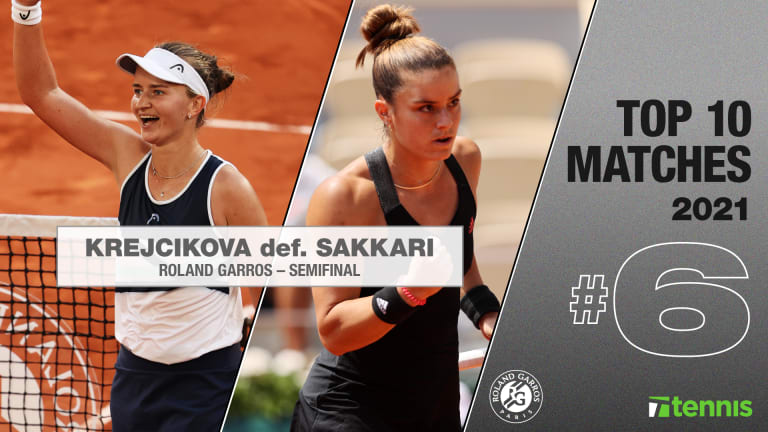The Top 10 Matches of 2021
The Top 10 Matches of 2021, No. 6: Barbora Krejcikova d. Maria Sakkari, Roland Garros semifinal
By Dec 03, 2021The Top 10 Matches of 2021
The Top 10 Matches of 2021, No. 1: Novak Djokovic d. Rafael Nadal, Roland Garros semifinal
By Dec 10, 2021The Top 10 Matches of 2021
The Top 10 Matches of 2021, No. 2: Leylah Fernandez d. Elina Svitolina, US Open quarterfinal
By Dec 09, 2021The Top 10 Matches of 2021
The Top 10 Matches of 2021, No. 3: Carlos Alcaraz d. Stefanos Tsitsipas, US Open third round
By Dec 08, 2021The Top 10 Matches of 2021
The Top 10 Matches of 2021, No. 4: Paula Badosa d. Victoria Azarenka, Indian Wells final
By Dec 07, 2021The Top 10 Matches of 2021
The Top 10 Matches of 2021, No. 5: Novak Djokovic d. Stefanos Tsitsipas, Roland Garros final
By Dec 06, 2021The Top 10 Matches of 2021
The Top 10 Matches of 2021, No. 7: Ashleigh Barty d. Karolina Pliskova, Wimbledon final
By Dec 02, 2021The Top 10 Matches of 2021
The Top 10 Matches of 2021, No. 8: Rafael Nadal d. Stefanos Tsitsipas, Barcelona final
By Dec 01, 2021The Top 10 Matches of 2021
The Top 10 Matches of 2021, No. 9: Naomi Osaka d. Garbiñe Muguruza, Australian Open Fourth Round
By Nov 30, 2021The Top 10 Matches of 2021
The Top 10 Matches of 2021, No. 10: Novak Djokovic d. Alexander Zverev, US Open Semifinal
By Nov 29, 2021The Top 10 Matches of 2021, No. 6: Barbora Krejcikova d. Maria Sakkari, Roland Garros semifinal
What all great matches are about: human emotions. This anxious epic in Paris was far from perfect, but it was tennis at its hair-raising best.
Published Dec 03, 2021

© Photos via Getty Images